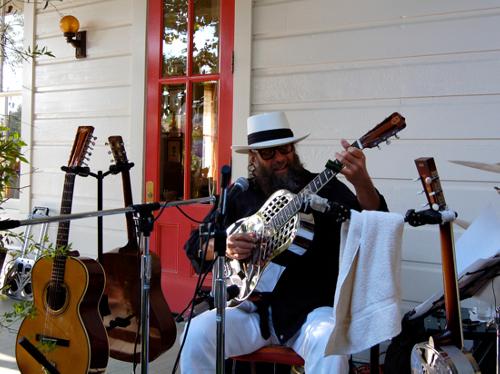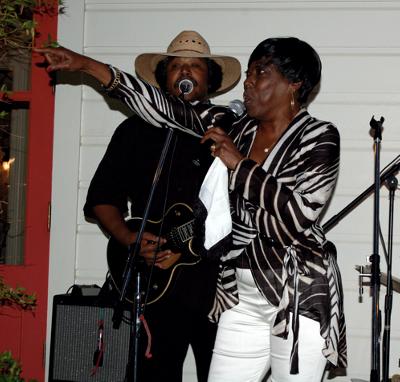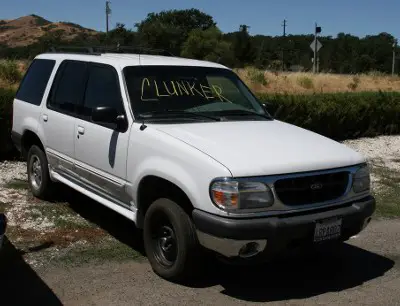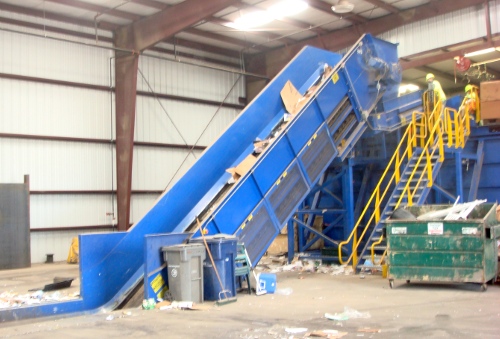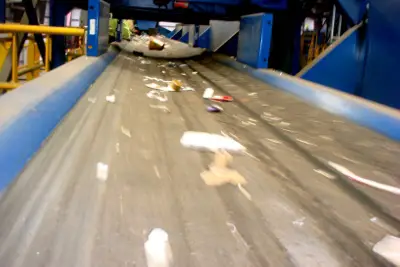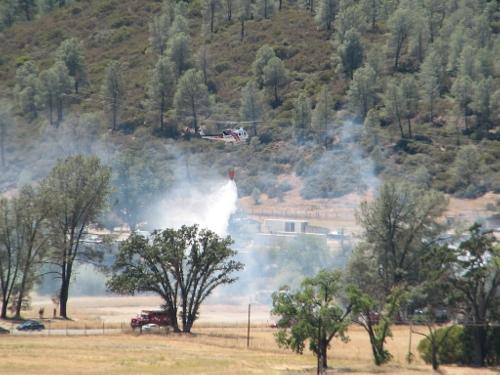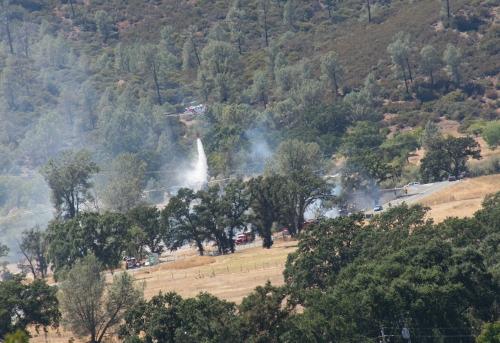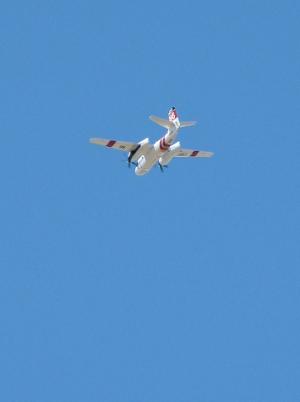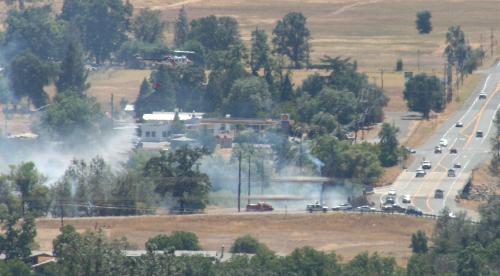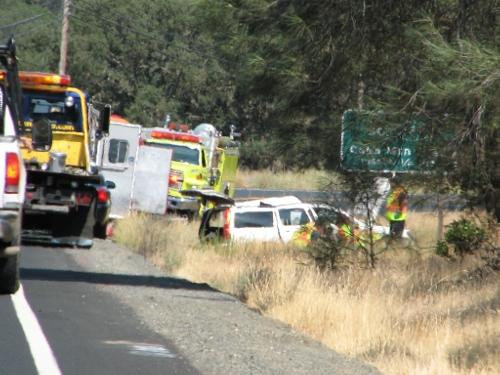- Elizabeth Larson
- Posted On
Defense witnesses contradict powerboat operator in fatal boat crash trial
Bismarck Dinius, 41, is facing felony boating under the influence with great bodily injury for an April 29, 2006, boat crash. He was at the tiller of a sailboat owned by Willows resident Mark Weber, whose girlfriend, 51-year-old Lynn Thornton, died as a result of injuries in the crash. The sailboat is alleged to have been under way without lights and the prosecution alleges that Dinius was legally intoxicated.
On Tuesday, Russell Perdock was on the stand. Currently a sheriff's captain, Perdock was off duty when his powerboat collided with Weber's sailboat. He has not been charged in the case, but issues of his speed and responsibility have been linchpins of defense attorney Victor Haltom's case.
Perdock maintained on Tuesday that he was driving his powerboat at about 35 miles per hour, the sailboat wasn't lit and he didn't set foot at Konocti Harbor Resort & Spa the night of the crash.
But testimony on Wednesday challenged critical portions of his testimony, from his speed to his whereabouts, with some witnesses maintaining they saw the sailboat with lights.
The day's first witness was Hans Peter Elmer, now a rancher in Montana. A retired police officer whose duties included being a watch commander of the East Bay Regional Park District's marine patrol, Elmer was at the Young Scandinavians Club, sitting on top of a picnic table overlooking Konocti Bay after dinner with his wife, when they witnessed the crash.
Elmer said he heard the powerboat coming around Fraser Point before he saw it enter Konocti Bay, with its running lights visible and the boat itself visible in light that was reflected on it. “I could see he was traveling at a very high rate of speed for nighttime.”
He recalled he told others at the club that night, “There's an idiot for you. He's going to kill himself or somebody else.” Five or six seconds later he heard the loud sound of fiberglass crashing together.
Elmer said he didn't see what the boat hit, because he had watched the powerboat and nothing else ahead of it. He estimated the crash occurred about 15 to 20 seconds after the boat came around Fraser Point.
He grabbed a cell phone and tried to call 911 but couldn't get through. He tried another cell phone and reached a 911 operator, who told him they were fielding other calls. Elmer told the dispatcher he and about 20 other witnesses were there and he suggested having a deputy come out to take their statements.
He said he dispatcher told him, “We've got it covered.” A deputy never came out and Elmer said local law enforcement never called him. Elmer said 10 days after the crash he heard the Sacramento County Sheriff's Office was investigating the incident and left four messages before then-Sgt. Charles Slabaugh called him back.
Hopkins asked questions about Elmer's police background. Elmer started as a police officer with the University of California, Berkeley in 1974 before transferring to the East Bay Regional Park District, the country's largest regional park system, which is located in Alameda and Contra Costa counties. He supervised patrol units in Contra Costa County and did boat patrol as well. He was promoted to sergeant in 1979 and retired in 1987.
Hopkins asked if he is familiar with how dispatchers can be overrun with calls during collisions. Elmer said yes.
Elmer, who has been visiting the Young Scandinavians Club since 1962, said the powerboat “sounded like a dragster” when it came around Fraser Point, traveling in a southwesterly direction.
He said its stern light disappeared in its wake five or six times as it traveled at a 45-degree angle before planing out. Even with the shore lights Elmer said he could clearly see the boat as it accelerated. He said he was afraid the boater was going to hit a log or dock and kill himself.
Elmer said he had a clear view of the whole bay, adding there is a flagpole there that his daughter always puts her underwear up when they visit.
As he watched the powerboat, he saw its lights go up in the air, come down and then it went dark.
Hopkins asked if he had said in other statements that there was no moon. “I don't remember that,” said Elmer.
Elmer said he had been counting to estimate the boat's speed, but couldn't remember at what number he stopped. “When I heard the crash everything else changed.”
Hopkins questioned him further about the 911 calls. Was it his opinion that the sheriff's office needed to send someone to interview he and other witnesses? Yes, said Elmer.
Several men from the club went out in a boat to offer help. “I could tell from the cries of help that somebody was seriously injured,” said Elmer.
“Why did you think they could spare somebody to talk to you?” Hopkins asked.
Elmer said the dispatcher didn't take his name and number when he tried to give it to her. In all Elmer made three 911 calls. “They told me they had it covered. I assumed that meant they were going to come out and talk to me.”
When Haltom attempted to ask Elmer to give an estimate of the powerboat's speed, Hopkins objected, saying, “That's beyond the scope.”
Byrne sustained, saying it's beyond the scope of the expertise for Elmer that had so far been established. “I think you're asking for speculation.”
Haltom asked to offer proof, and then asked Elmer if he had watched boats and estimated speed before. Yes, said Elmer, in the scope of employment. He also received training in estimating boat and traffic speed.
Hopkins still challenged the foundation for the evidence. But when Elmer estimated the boat's speed at between 50 and 55 miles per hour, Byrne allowed it to stand.
Had Elmer paced cars and done radar? Hopkins asked. Yes, said Elmer. He'd also done it on boats.
“You feel pretty comfortable about your ability to fix a speed?” Hopkins asked.
Elmer said yes, noting that he had written “a couple hundred” citations to boats for speeding. Hopkins asked how many were at night. Elmer couldn't say, but he was confident that at night it's even easier to determine speed due by using points of light.
What if the stern drive's engineer said the stern drive would have broken off above a certain speed? Hopkins asked. “I know that guy was going way faster than 40 miles per hour,” Elmer replied.
Knight was invited on nighttime cruise
Julie Knight testified to going to Richmond Park Bar & Grill in the hours before the crash with her friend, Jean Strak.
There they were eating, dancing, singing karaoke and watching the sailboats. She met Dinius there, and he invited her and Strak out on the night cruise but they declined.
Asked if the lights were on, she said, “They were. Absolutely,” noting she waved goodbye to them as they left.
Under Hopkins' questioning, she said said arrived at the restaurant about 7 p.m. Hopkins asked if she and her friend hadn't arrived at either 3 p.m. or 4 p.m. Knight believed it was later in the evening, but said it could have been earlier.
She was drinking champagne that evening when she and Strak met Thornton. They had dinner and she met Dinius at the bar, where he bought her a couple of drinks.
“Was Mr. Dinius being flirtatious with you?” Hopkins asked.
Knight said she didn't think so, saying he was just having fun. They talked but she added, “I wasn't hanging out with him,” because they were with different groups.
She went outside with Strak, who was smoking a cigarette overlooking the boats. “It was getting dark and it was lit up,” Knight said of the sailboat. She didn't recall a motor.
Hopkins asked if she had told an investigator that she got to the restaurant at 3 p.m. and watched the races. “I don't recall talking to anybody.” She did, however, remember, talking to Haltom's investigator more recently.
Statement places Perdock at resort
Next up was Dennis Olson, formerly assistant director of security at Konocti Harbor Resort & Spa. He was transported from the Lake County Jail, where he is serving time in connection with a hit and run that occurred last year. When he appeared before the jury he wore street clothes.
Olson said he knows Perdock – he'd seen him at the resort over the years and their children were on the same sports team – and he saw him at the resort “several times” over a few hours.
He said Perdock was at the main bar and the outdoor Tenderfoot Bar, where he was with a group of five adults, males an females; he didn't recall children being with the group. About 60 people were at the resort that night.
Olson didn't remember seeing Perdock's friend Craig Scovel, who had testified to being at the resort the night of the crash. If he had seen Scovel, who he knew, Olsen said he would have said hello.
He said he recognized Perdock's boat, although he could not describe what it looked like. He saw the boat leaving the resort's harbor but didn't recall Perdock getting into it before it pulled out. Olson said Perdock's group was saying it was “dead” at Konocti Harbor and they were going to Richmond Park.
He said he heard about the crash just after 9 p.m., about 25 minutes after he saw Perdock's boat leave the facility. That's when a 911 dispatcher called the resort's front desk to ask for help with landing a helicopter.
Olson saw Young Scandinavian Club members come in that night, noting they appeared shaken up. Sheriff's deputies also walked through the resort and asked if Perdock had been at Konocti Harbor that night.
Hopkins asked Olson what he remembered about the helicopter landing. Olson said they set up the landing spot in an upper part of the resort where helicopters have landed before. They put down flares and sandbags to hold them down. He said an ambulance came up and a person was loaded onto the helicopter. Later the deputies told him it was a woman who had been involved in a crash involving Perdock.
Did Olson remember the deputies? Olson said there was something said at the crash scene that Perdock was there. “I'm not asking you for the whole conversation, I'm just asking you if you remember who the officers were,” Hopkins said.
Olson didn't recall if the ambulance or helicopter left first. He didn't remember a concert that night.
During testimony, Olson said during his 10 years working at the resort he had seen Perdock drink at the resort during some of his visits, but added that he never saw him drink when he was running his own boat.
Strak recalls a well-lit sailboat
Jean Strak told the jury that she saw the sailboat completely alight before it set out on the lake that night.
She said she and Knight got to Richmond Park at about 3 p.m. or 4 p.m., met a lot of people and talked to Dinius, who invited them on the sailboat. Strak wanted to go on the cruise but Knight didn't want to.
“I saw the lights on,” said Strak, who worked for Bayshore Marine Service and now supervisors Konocti Harbor's marina. If she hadn't seen the lights, “I woulda yelled at 'em.”
Strak, who said the whole boat was lit up with white lights all around it, stated that a uniformed deputy came to her tanning salon in the Clear Lake Riviera the following week to interview her for an hour. She also gave a statement to an insurance adjuster.
Watching the boat pull out as she smoked a cigarette, Strak remembered a “little tiny motor” being used to pull the boat out. At that point, “It wasn't pitch black but it was just after dusk,” she said. “It was to the point where I would have known if the lights weren't on.”
Hopkins – pointing to Sgt. Dennis Ostini, sitting beside him at the prosecution table – asked if he had interviewed Strak at her salon. “No, he was younger,” she said of the deputy who interviewed her, adding, “No offense.'
Strak was positive that she spoke with the deputy within a week of the incident, but she couldn't remember his name.
Witness claims something is “fishy” with case
Peter Erickson was with Elmer at the Young Scandinavians Club the night of the crash. He was helping clean up dishes after dinner, and didn't see the accident, but he responded to it on his boat along with four others.
He said he drove his boat out very slowly to the scene, which he found following Elmer's directions. “It was completely pitch black. You could barely see in front of the boat.”
The night was so dark that they were 60 feet from the sailboat, darkened after the crash, when they came upon it, Erickson said.
He said he asked if everyone on the boat was all right, and they told him they needed help immediately. “It sounded like the guy was crying.”
Two of the men on his boat got onto the sailboat and began cardiopulmonary resuscitation on Thornton while others called 911.
Erickson initially thought the crash site was a crime scene, and he was reluctant to move the boats. He said he was yelling at another boat in front of him to get out of the way as he towed the sailboat to shore and was told the boat couldn't be moved because it was disabled, a reference to Perdock. Hopkins objected and moved to strike the statement, and Byrne sustained.
Erickson towed the sailboat in to Boren Bega, where paramedics cared for Thornton and Ostini interviewed him.
“He told me the lights were off on the sailboat,” Erickson recounted of his interview with Ostini. Another deputy took names and information.
Erickson said he saw Perdock on shore. “He seemed very agitated and he was talking on the cell phone for a large portion of the night.”
He recounted hearing Perdock making a statement about having a soda at Konocti Harbor and going to Richmond Park for a soda.
“It was the most chaotic night of my life,” said Erickson. “It was almost surreal.”
Erickson and his friends later went back to the club and then on to Konocti Harbor, where he had contact with Olson.
Under Hopkins' cross-examination, Erickson maintained he definitely heard Perdock talking about getting a soda at Konocti Harbor while speaking with deputies.
At the scene deputies kept walking up to Perdock and shaking his hand. “I thought that was weird,” he said, so he tried to get closer so he could overhear what was being said.
Erickson believed he saw Perdock at the scene after midnight, and Hopkins asked him if it would be different if there were hospital records showing otherwise. Erickson's response was that everything in the case was “fishy.”
He added, “I don't believe a lot of what's been said,” but he said he had no bias in the case.
Following the crash the men went to Konocti Harbor for a last call, said Erickson. “Our nerves were frayed, our adrenaline was pumping, it was chaotic.”
Hopkins asked if Elmer told him the boat was going 60 miles per hour that night. “He said it was flying,” Erickson said, adding he believed it was going between 50 and 55.
Erickson maintained the boat was going “way too fast for conditions.”
“I know that because there was an accident and people died so it wasn't a safe speed,” he said.
Resort security director says he saw Perdock before the crash
Defense team member Paige Kaneb questioned the next witness, Joe Gliebe, Konocti Harbor's security director since 2004.
Gliebe and Olson worked on the night of the crash, and together assisted with the landing of an air ambulance helicopter that Gliebe said didn't end up transporting a patient, contrary to Olson's earlier statement. He said there also wasn't an ambulance that came to the resort to meet the helicopter.
Gliebe, who said he knows Perdock through the sheriff's office and as a patron, said he saw him earlier that night on a ramp coming from the marina into the resort's outdoor Tenderfoot Bar. It was getting dark and Gliebe said Perdock was a distance away that in court was estimated to be about 20 feet.
He said he waved at Perdock, briefly said hello and continued in his rounds. Gliebe successfully picked Perdock's picture out of a photo lineup presented to him by District Attorney's Office investigators, as Olson also had done.
Gliebe also remembered sheriff's deputies walking through later that night, which he said is common.
Myra Martinelli, a Konocti Harbor security guard who wasn't on duty that night, gave the shortest amount of testimony so far. In only about a minute on the stand, she recounted that she was heading to the resort that night to hang out and heard about the crash on a police scanner about 15 to 20 minutes before arriving.
Martinelli said she got to the resort at about 9:45 p.m., where she interrupted Gliebe and Olson, who were her superiors in the security department, talking about the crash. She said she heard them mention Perdock, a statement to which Hopkins objected. Byrne sustained the objection.
Haltom did not question her further and Hopkins did not cross-examine Martinelli.
Ex-wife disputes Perdock's time line
Perdock's ex-wife, Donna, took the stand Wednesday afternoon. Her testimony contradicted an events time line Russell Perdock submitted to District Attorney's Office Investigator John Flynn.
She said she was at home with her son and his friends, who were over for a slumber party, when she received a cell phone call from her then-husband to tell her about the crash. The call cut off and she couldn't reach him, so she called his mother.
Later, she left after midnight to pick him up from the emergency room at Redbud Community Hospital, since renamed St. Helena Hospital-Clearlake. She found him with sheriff's Chaplain Bob Sola. He was bleeding from the head and briefly told her what happened.
“He was upset. You could see that,” she said.
She said she only ever saw him wear glasses when he came home at night. The doctor had given him a prescription which she thought were for tired eyes.
Haltom asked if Russell Perdock drives fast in his speedboat, and if he finds it exhilarating. Donna Perdock said yes.
The day of the crash began with her making breakfast for their son and helping pack his things for a Scout hike. She disputed Russell Perdock's account in his time line that he made breakfast for his son.
Later, when they gathered for a birthday party for their son at Lower Lake pizza parlor, she said he arrived at 3 p.m., not 4:50 p.m., saying that the time line only allowed for an hour and 10 minutes for a birthday party attended by seven or eight boys. Donna Perdock said he had a beer at the pizza parlor.
She estimated he spent 45 minutes getting his powerboat ready to put in the water. She asked him not to go because she had three of their son's friends staying over for a slumber party, but she said he told her to “deal with it,” and left in the boat at around 7 p.m., not 8 p.m. It was still light at the time.
When it was rough water, Russell Perdock drove his powerboat slower, she said, and faster when it was smooth. She said the boat went on plane at 30 miles per hour.
Haltom briefly recalled Ostini to the stand, asking how long the sailboat was left unattended at the sheriff's Boat Patrol facility on the day following the crash. Ostini said it was from 2 a.m. to about 9 a.m.
“I made a mistake. I should have had somebody on it,” Ostini said.
At the time, he said he didn't think they had the equipment or resources to get the boat out of the water at 2 a.m. “It took multiple people to do that.”
Speed skier says he and Perdock raced their boats in hours before crash
John Jansen, a speed skier, was the day's last witness. He said he spent much of April 29, 2006, on the lake, practicing with friends.
He said he knew of Perdock, who he saw socializing, with a drink in his hand, at Konocti Harbor's Tenderfoot Bar at around 5:30 p.m. or 6 p.m.
Later, at around 7:30 p.m. or 8 p.m., Jansen said he and Perdock raced across the lake to Pine Dell Resort.
It took only a few minutes to get across the lake in Jansen's fast boat, which he said outpaced Perdock's. “I just shut my boat down. There's no way he was catching me.”
After the race, Jansen said Perdock came up to him and they talked briefly about boats before Perdock went on his way. Jansen then headed back to the resort, running his boat around to see if anyone could beat him. Back at Konocti Harbor, he said he didn't see Perdock there.
Hopkins asked Jansen if he knows Denise Rockenstein, reporter for the Clear Lake Observer American and the Lake County Record-Bee, and if he was at the Lakehouse Inn in Clearlake with two friends talking about racing to Pine Dell in Rockenstein's presence. He said no.
Did he tell Rockenstein about the race? Hopkins asked. “She questioned me about it,” said Jansen.
Hopkins asked if Jansen told Rockenstein that he raced with Perdock in the afternoon. “No, I told her it was in the evening.”
At the end of court Judge Byrne told the jurors they were ahead of schedule in the trial, with evidence likely to be completed Aug. 18. Final arguments and instructions are tentatively scheduled for Aug. 20, with the case going to the jury either Aug. 20 or Aug. 21.
“The case will be in your hands and I can't tell you how long it will take,” said Byrne.
Testimony continues Thursday.
Witnesses so far, in order
Day one (following opening statements): James Ziebell, sailor, helped skipper Beats Workin' II in Konocti Cup; Doug Jones, past commodore of local sailing club; Anthony Esposti*, fisherman; Colin Johnson*, fisherman.
Day two: Lake County Sheriff's Det. Jerry Pfann; Andrea Estep*, phlebotomist, St. Helena Hospital-Clearlake (formerly Redbud Community Hospital); former sheriff's Sgt. James Beland; LaDonna Hartman, phlebotomist, Sutter Lakeside Hospital; retired sheriff's Sgt. Mark Hoffman; California Department of Justice criminalist Gregory Priebe, Santa Rosa lab; California Department of Justice criminalist Gary Davis, Sacramento toxicology lab.
Day three: Jennifer Patterson, witnessed crash from Holdener property on lakeshore; Gina Seago, witnessed crash from Holdener property on lakeshore; Jordin Walker, passenger on Russell Perdock's powerboat; James Walker*, high school friend of Perdock's and passenger on his powerboat; sheriff's Deputy Mike Morshed*; sheriff's communications operator Kimberly Erickson; sheriff's Boat Patrol Deputy Lloyd Wells*.
Day four: Craig Woodworth, the District Attorney's Office's acting chief investigator; John Yount, criminalist with the California Department of Justice's Santa Rosa lab; sheriff's Det. Jerry Pfann; Boat Patrol Supervisor Sgt. Dennis Ostini; Lt. Charles Slabaugh of the Sacramento County Sheriff's Office.
Day five: Richard Snyder, retired Mercury Marine engineer; Lt. Charles Slabaugh of the Sacramento County Sheriff's Office.
Day six: Lt. Charles Slabaugh of the Sacramento County Sheriff's Office; California Department of Justice criminalist Toby Baxter; retired Sgt. Wes Frey, Lake County Sheriff's Office; Jeff Holdener, who responded to the crash scene via boat; Stephanie Green, friend of Weber and Thornton, who saw them leave in the sailboat a few hours before the crash; Craig Scovel, friend of Perdock's who assisted in taking his boat and trailer to the sheriff's Boat Patrol building.*
Day seven: Craig Woodworth, the District Attorney's Office's acting chief investigator. The prosecution rested.
Day eight (Defense begins presenting case): Dr. William Chilcott, forensics engineer; Mark Weber, owner of the Beats Workin' II and Lynn Thornton's longtime boyfriend.
Day nine: Mark Weber; Brian Stole, witness at Bayview Estates; Zina Dotti, passenger on the Beats Workin' II; Ed Dominguez, passenger on the Beats Workin' II and Dotti's fiance; Russell Perdock, owner of Baja powerboat that hit the Beats Workin' II.*
Day 10: Hans Peter Elmer, retired police officer, witnessed crash from Young Scandinavians Club; Julie Knight, met Dinius at Richmond Park and saw sailboat leave; Dennis Olson, formerly assistant director of security at Konocti Harbor Resort & Spa; Jean Strak; witness at Richmond Park; Peter Erickson, responded to crash from Young Scandinavians Club; Joe Gliebe, Konocti Harbor's security director; Myra Martinelli, Konocti Harbor security guard; Donna Perdock, Russell Perdock's ex-wife; John Jansen, ski racer.
* = Indicates a witness subject to recall at the request of the defense.
E-mail Elizabeth Larson at This email address is being protected from spambots. You need JavaScript enabled to view it. .

